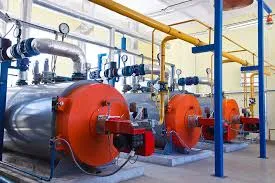
Қар . 16, 2024 10:40 Back to list
normal boiler water temperature
Understanding Normal Boiler Water Temperature A Key to Efficient Heating Systems
Boilers play a crucial role in heating systems across various applications, from residential to industrial settings. One of the most critical factors in the efficient operation of a boiler is maintaining the correct water temperature. Understanding what constitutes a normal boiler water temperature is essential for ensuring both safety and efficiency in heating processes.
What is Boiler Water Temperature?
Boiler water temperature refers to the temperature of the water within the boiler system as it heats or cools. This temperature is pivotal because it affects the performance and efficiency of the boiler. It also impacts the overall energy consumption and can influence the longevity of the heating system.
Normal Temperature Ranges
The normal water temperature for most residential hot water boilers typically ranges from 160°F to 200°F (approximately 71°C to 93°C). For steam boilers, the temperature can be higher, usually ranging from 212°F (100°C) at atmospheric pressure to several hundred degrees at elevated pressures. It's crucial to note that these values can vary depending on the specific boiler type and the intended application.
For instance, in hydronic heating systems, wherein heated water is circulated through radiators or underfloor heating, temperatures on the lower end of that range are often sufficient to provide comfortable heating. Conversely, industrial boilers or those used in commercial settings may require higher temperatures for effective operation and to meet specific process needs.
Why is Maintaining Normal Temperature Important?
1. Energy Efficiency Proper water temperature helps ensure that the boiler operates efficiently, reducing waste and lowering energy bills. If the water temperature is too low, the boiler will cycle more frequently, consuming unnecessary energy. Conversely, excessively high temperatures can lead to increased wear and tear on components, resulting in higher maintenance costs.
normal boiler water temperature

2. Safety Boilers operate under pressure, which can pose safety risks if not managed correctly. Maintaining water temperature within normal ranges reduces the risk of overheating and potential explosions. Furthermore, high-pressure boiler systems must be monitored closely to avoid hazardous situations.
3. System Longevity Consistently operating within the normal temperature range can prolong the lifespan of the boiler and its components. Overheating can lead to scaling, corrosion, and damage to critical components like pumps and heat exchangers.
Monitoring and Adjusting Water Temperature
To maintain optimal boiler water temperature, regular monitoring is necessary. Most modern boilers are equipped with gauges and temperature sensors that provide real-time readings. Additionally, advanced systems often have automated controls that can adjust the temperature based on the heating demand, thus ensuring efficiency and comfort.
Operators should be attentive to any fluctuations in temperature. A sudden drop might indicate a malfunction, such as a faulty thermostat or a leak in the system. On the other hand, consistent high temperatures could signal issues like a failing pressure relief valve or improper water levels.
In many cases, professionals recommend setting the boiler temperature between 180°F and 190°F (82°C to 88°C) for optimal performance without excessive energy consumption. It's essential to consult the boiler’s manual or a heating professional to determine the most suitable range for a specific application.
Conclusion
In conclusion, understanding normal boiler water temperature is vital for anyone involved in the operation or maintenance of heating systems. It not only affects energy efficiency and cost savings but also enhances safety and prolongs the lifespan of the boiler system. By monitoring and adjusting water temperature as needed, users can ensure their heating systems operate effectively and safely, contributing to a comfortable environment while minimizing energy waste. Clear communication with heating professionals and a proactive approach to maintenance can empower users to take full advantage of their boiler systems and provide steady, reliable heat for years to come.
-
Efficient Biomass Fired Hot Water Boiler | AI Heating Solution
NewsAug.01,2025
-
High-Efficiency Gas Thermal Oil Boilers | HPT Models
NewsJul.31,2025
-
Oil Fired Hot Water Boilers Sale - High Efficiency & Affordable
NewsJul.31,2025
-
High-Efficiency Commercial Oil Fired Steam Boiler for Industry
NewsJul.30,2025
-
High-Efficiency Biomass Fired Thermal Oil Boiler Solutions
NewsJul.30,2025
-
High Efficiency Gas Fired Thermal Oil Boiler for Industrial Heating
NewsJul.29,2025
Related PRODUCTS






















